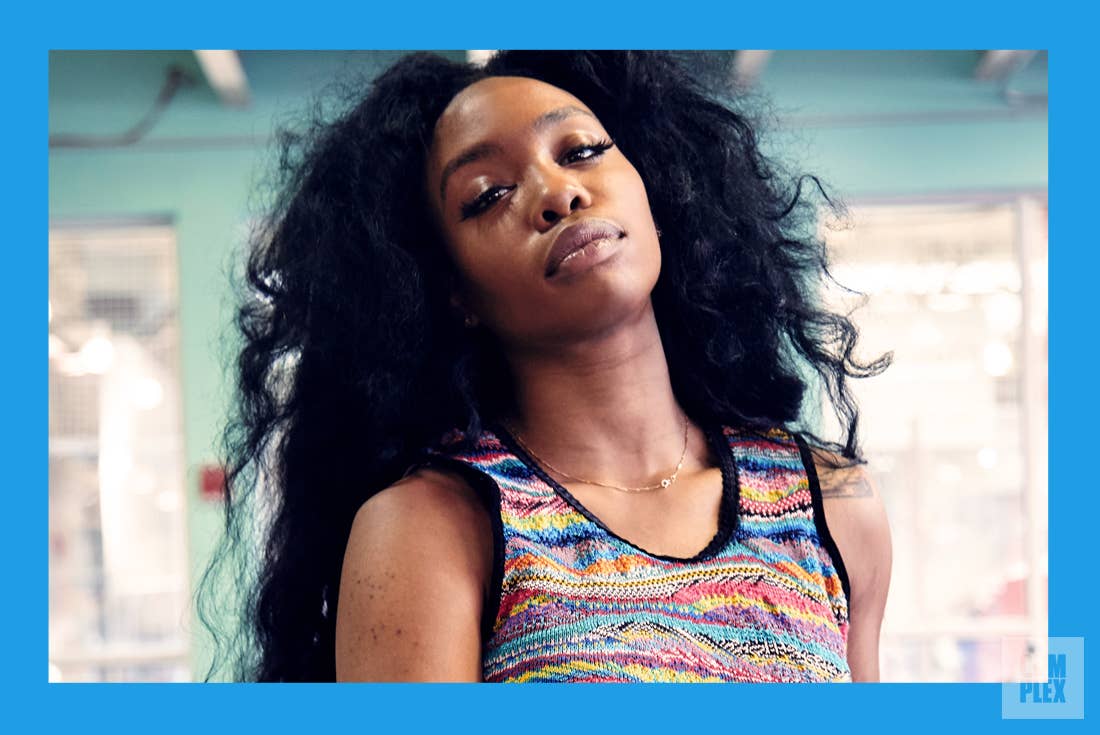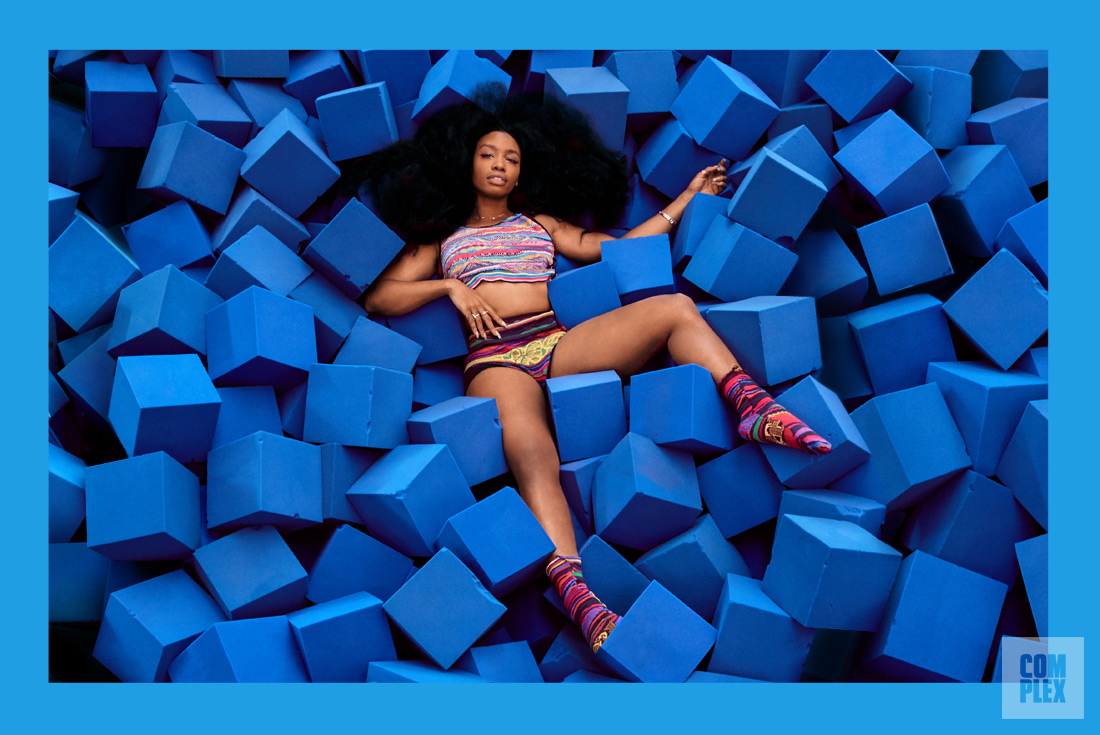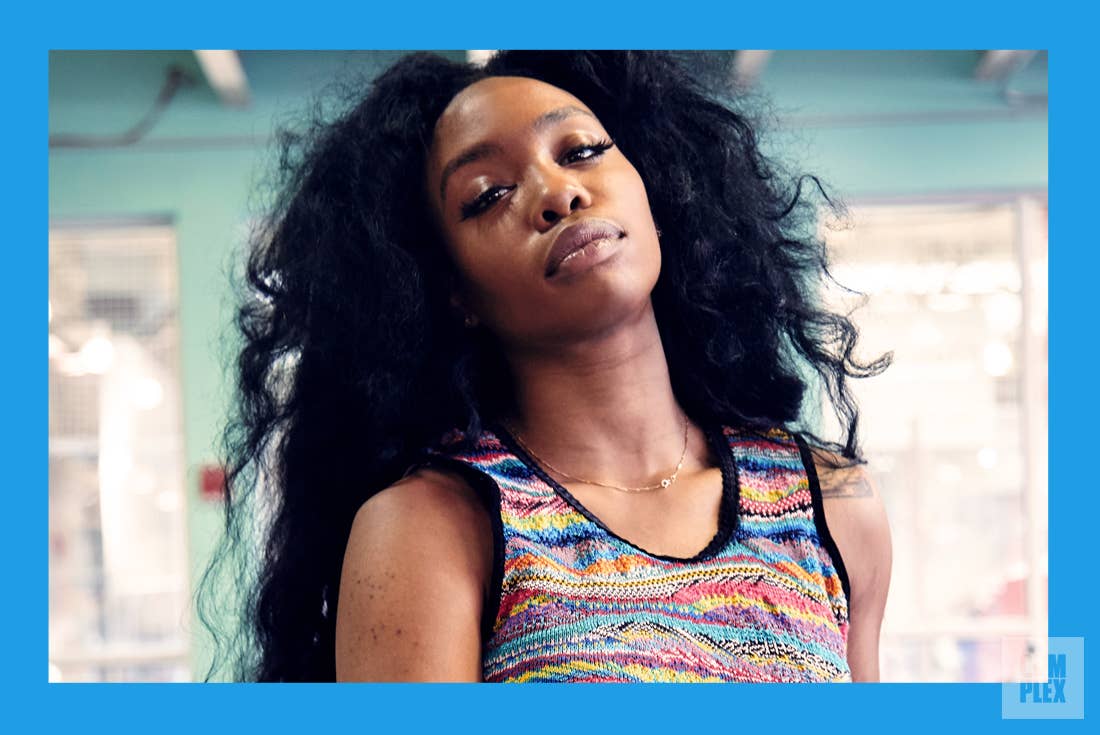
Walking into Chelsea Piers’ 23,000-square-foot gymnastics center in Manhattan, you’d think SZA was a world-class athlete. Dressed in a custom, rainbow-colored two-piece and matching socks that her friend made using scraps of Coogi fabric, she’s bouncing up and down on an in-floor trampoline, bending her knees before she executes a backflip several feet in the air. On another jump, she does a nearly flawless side split. “Gymnastics is my guilty pleasure,” says SZA, who practiced the sport for 13 years and considered training for the Olympics. Underneath a thick pillow of hair, her eyes beam with excitement. “I’m obsessed.”
SZA (real name Solána Rowe) isn’t a gymnast, of course. The 26-year-old is a singer known for her chilly, raspy vocal style, which first caught the attention of Terrence “Punch” Henderson, co-president of record label Top Dawg Entertainment (also home to Kendrick Lamar, Schoolboy Q, and others) in 2011. After a string of acclaimed EPs, she has an as-yet-untitled debut album, shaped by a string of personal tragedies and revelations, coming at the top of 2017. She has also written standout songs for Rihanna (“Consideration,” which she sings on as well) and Beyoncé (the Nicki Minaj collaboration “Feeling Myself”). Her career is undoubtedly on the rise—but how much longer she’ll continue it is up in the air.
This past October, SZA tweeted, “I actually quit. @iamstillpunch can release my album if he ever feels like it. Y’all be blessed.” She deleted the cryptic message later that day, but not before it was picked up by several media outlets. The headline at Vibe, for example, asked: “Did SZA Quit Music for Good?” Understandably, speculation that she had beef with her label ran rampant.
“I’ll probably just do something different, something visual, probably film,” she says with a shrug a week after the incident. “I’m really frustrated, and I’m kind of over it. I have a lot of anxiety and there’s a lot going on in my life.”
She clarifies her relationship with TDE further, insisting that rumors of a rift were overblown: “Me and Punch never get along—that’s every day,” she says, likening their relationship to that of any close-knit family. “They call me one of the homies. We’re all different, and that was hard to understand [at first] because they’re tough-love people and hard to read, but I dig it now. I don’t have any issues with my label. My label has been nothing but supportive of everything I’ve wanted to do.” (Punch declined to comment about their rumored beef.)
But what about quitting music? “I mean…” She trails off.
"I Don't have the energy to create a filter anymore."
At an Irish pub a few blocks away from Chelsea Piers, in gray sweatpants and a matching sweater, SZA is singing, in her sky-high falsetto, the first line of “Don’t Touch My Hair,” the single off of Solange’s chart-topping album A Seat at the Table. “It’s so beautiful,” she says. She’s talking about her love for Solange, Beyoncé (“She’s literally a queen”), and the cultural impact of black women in 2016. “I feel good being a black woman; I’ve always felt good. But to be a black woman right now, it definitely feels like I have back-up. That’s a good feeling. I’ve never felt like that before.”
Born in St. Louis, SZA was raised by her parents (her dad was a producer at CNN and her mom was an executive at AT&T) in Maplewood, New Jersey, a predominantly white suburb near Newark. She was raised Muslim, but attended Jewish camp. There, at school, and at the International Gymnastics Camp where she trained, she was often one of few black girls—sometimes the only one. “My parents didn’t make a big deal out of being black,” says SZA. “They didn’t make me feel like, ‘You’re the only black girl on the [gymnastics] team.’ But I felt different because I didn’t look the same.”
SZA never dreamed of becoming a singer. She had a sheltered, Orthodox Muslim upbringing, forbidden to watch television or listen to the radio. Her only interactions with contemporary music were through friends or her older half-sister, who listened to Wu-Tang Clan, Cash Money, and Lil Jon. SZA studied marine biology in college before smoking too much weed and failing out during her freshman year. Singing had nothing to do with it—she hoped to work at a zoo or become a scientist, gymnast, or dancer.
With the encouragement of friends and family, she began dabbling in music. At 19, she sang background vocals for her brother, a rapper who performs under the name Mnhattn. Shortly thereafter, she made her first song. “I just stumbled into it,” she says.
In 2011, SZA met Punch at Lamar’s Gramercy Theatre show during the CMJ festival in New York. She was dropping off clothing for TDE from 10.Deep, a streetwear brand she worked for at the time that was sponsoring the concert, when Punch overheard SZA’s friend playing her music. In 2012, she released the EP See.SZA.Run, and signed with TDE the following year. Since then she has put out two other EPs: S and Z, both part of a trilogy based on her initials.
SZA says she felt pressured to release a new project right after Z, which took her buzz to a new level: “I thought, ‘No one’s gonna fuck with me [if I don’t].’” But she realized later she needed to go back to the basics first. “I don’t think I knew what an album was like. I didn’t know how to make an album,” she says. “I just became an artist one mixtape ago.”
So last year, Punch introduced SZA to Grammy-winning singer-songwriter-producer James Fauntleroy, who has worked with Rihanna, Kanye West, and Lamar. The two worked on SZA’s album at the 1500 or Nothin’ studios in Inglewood, California, for a month. “He didn’t talk to me. I just sat there and watched him press buttons,” she recalls. “I wanted to learn.”
“A lot of times, I’d be working on something for her and she was watching,” Fauntleroy recalls. “But even still, she’s her own artist, so my Mr. Miyagi thing wasn’t as glamorous as the actual Miyagi. If she didn’t know what she was doing, then she probably wouldn’t have even been allowed to sit in in the first place. But she’s so awesome already.”
SZA also “spent a lot of time around” singer-producer-bassist Thundercat, Tyler, the Creator, Lamar, frequent Beyoncé collaborator Boots, and Rick Rubin, the legendary producer famed for “reducing” songs to their most powerful, bare-bones core.
“He taught me that the more you move away from any sound, the more space you create for other things to be great,” SZA says of Rubin. “It was about understanding simplicity.”
After she left Rubin’s Shangri La compound in Malibu, she wrote a few songs, including Rihanna’s “Consideration,” which was originally titled “LouAnne Johnson,” after the school teacher-writer who inspired the 1995 movie Dangerous Minds. “That beat was Dangerous Minds to me in my head,” she says. SZA names all of her songs after actresses; her music is heavily inspired by films.
But there is one person in particular who SZA says “fucked my head up.” At first, she’s cagey about revealing the name, insisting she has to get Punch’s approval first. Later, it just rolls off her tongue. “I sat with Frank [Ocean], and that was crazy,” she says. “He has changed a lot. Watching his process, being in that musical place with him, just understanding and learning.”
Her album is more revealing and darker than her previous projects, which led some listeners to peg her as a descendant of earthy, so-called neo-soul artists like Erykah Badu. “I can’t hide in my music anymore,” she says, adding that the public’s idea of her isn’t accurate. “It’s funny because my friends rag on me about people saying I’m part of ‘Shea Butter Twitter’ and that I get crystals for gifts. But if you don’t define yourself, people do it for you. I don’t want that.”
The themes of the album, all of which she wrote herself, are control and honesty. SZA talks about her family, relationships, self-esteem, and growing up in a conservative home. On “Drew Barrymore,” a ’90s-indebted song (she calls it “brown grunge”) that could be the soundtrack for the 1999 romantic comedy Never Been Kissed, she sings: “It’s hard enough you gotta treat me like this/Lonely enough to let you treat me like this/Do you really love me or do you just wanna love me down?”
“She used to hide behind reverb and vibe, but this [album] is more raw,” Punch says. “You can tell she’s speaking from experience and there are a lot of feelings there.”

SZA explains her newfound candor: “My life has just been falling the fuck apart. I buried, like, three ex-boyfriends, my granny died, I buried someone two days ago… I’m devastated by the state of the world and the hatred.”
“Some days I feel militant and vengeful,” she continues. “Some days I feel defeated and I actually cry because I just don’t understand. Then you start getting biblical, like, ‘Why is this happening to my people?’ Then you go through, ‘It’s never going to change, so might as well just go with the flow.’ And then you go through, ‘No. I’m not asking anymore. I’m going to make it change.’”
SZA found solace in recent years by educating herself about the world and issues she cared about. She spent many late nights scouring the Internet and reading about social injustice, the environment, and the treatment of animals at zoos and SeaWorld.
“I [had] created this fake bubble where my brain thought all those things weren’t important, but that wasn’t real,” she says. “When you get older, you realize that the world is really happening around you.” She looks me square in the eyes. “But I feel alive and clear on what I want. I don’t have the energy to create a filter anymore.”
But SZA doesn’t seem like someone who is under a lot of stress. There’s a warm playfulness to her; she’s the kind of person you’d want to be around if you were going through your own tough time. She jokes with the server that the shrimp and grits plate she ordered was “not the wave” but still insists he keep it on the bill. She initially quips that her demeanor is a result of “washing my face twice a day, drinking water, and taking vitamins.” She eventually grows serious and explains her attitude by citing an astrology reading from the book The Power of Birthdays, Stars & Numbers. “It said I had bad stars, and I feel it. I believe it,” she says. “But it also said I have an unusual level of focus to be able to transcend shitty instances.”
Earlier that day, back at Chelsea Piers, SZA exchanges phone numbers with one of the gymnastics instructors—a petite but muscular blonde in a black track jacket and bike shorts. “It’s very good to relieve stress,” she says. She’d like to take up the sport again, but only recreationally. She needs an outlet—one that isn’t music.
SZA insists she doesn’t have any issues with the industry and that she still loves to sing and connect with fans. But it’s obvious there’s something about her music career that’s eating away at her. “Completing this [album] and these last couple of moments on the clock before this project is done are definitely the most pivotal moments of my life,” she says. “Growing up as a woman, making tough decisions, and sticking by my own shit is necessary. But I definitely...um…” Long pause. “I’m definitely committed to completing this and I think…” Another long pause. “We’ll take it from there.”


